In the News | Older
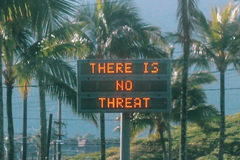 |
In the NewsJanuary 15, 2018Hawaii and the horror of human errorPaul McLearyThe AtlanticVipin Narang tweeted one scenario on Saturday. “POTUS sees alert on his phone about an incoming toward Hawaii, pulls out the biscuit, turns to his military aide with the football and issues a valid and authentic order to launch nuclear weapons at North Korea. Think it can’t happen?” |
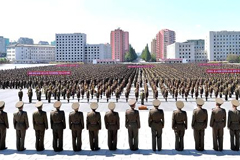 |
In the NewsJanuary 7, 2018North Korea’s sudden interest in talksNyshka Chandran | Nancy Hungerford CNBCNorth Korea's willingness to talk may be due to the strength of its nuclear capability, said Taylor Fravel, associate political science professor at MIT and acting director of the MIT Center for International Studies. |
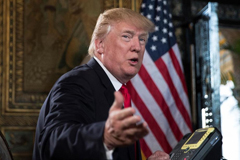 |
In the NewsJanuary 3, 2018Few checks can keep Trump’s hands off his ‘nuclear button’Joseph P. WilliamsU.S. News & World Report“The bottom line is if the president orders a valid and authentic order to release nuclear weapons, neither the chief of staff, nor the secretary of defense, nor the chair of the Joint Chiefs could legally stop him,” says Vipin Narang. |
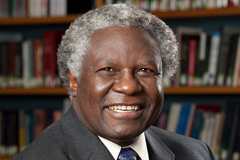 |
In the NewsDecember 15, 2017CIS mourns death of Harvard professorCalestous Juma was a DUSP MLK Visiting Professor (2014-15). “Calestous was that rarest of intellectuals—one who put his ideas into practice, and did so with a big, generous heart, filled with warmth and laughter. We enjoyed working with him immensely. His work and ideals will be a strong legacy for Africa and the developing world,” said CIS executive director and principal research scientist John Tirman. |
 |
In the NewsDecember 14, 2017Tell me how Trump’s North Korea gambit endsDaniel W. DreznerThe Washingon Post“Even if an American first strike knocked out North Korea’s nuclear capacity, millions of South Korean civilians, and American and South Korean soldiers, would be vulnerable to retaliation with conventional or chemical weapons” says Barry Posen. |
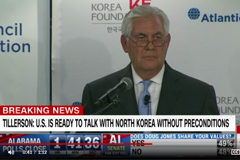 |
In the NewsDecember 13, 2017Tillerson says US won't set preconditions for North Korea talksNicole Gaouette and Joshua BerlingerCNN“You need both sides to be credible in the good cop-bad cop routine for it to work. There are too many doubts about the weight and credibility of Tillerson.” said Vipin Narang. “McMaster has the ear of the President and is much more credible.” |
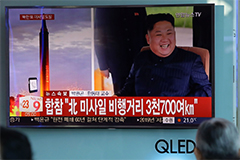 |
In the NewsNovember 29, 2017North Korea's recent, and possibly most powerful missile testVipin Narang, associate professor of political science and nuclear strategy expert, spoke with the BBC, Foreign Policy, and the New York Times, to discuss implications of Pyongyang's missile test last night. |
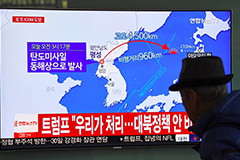 |
In the NewsNovember 29, 2017Trump promises new sanctions after North Korea's latest missile testWBUR Here and NowPresident Trump tweeted that major new sanctions will be imposed after North Korea's latest missile test. Jim Walsh puts the launch into context. |
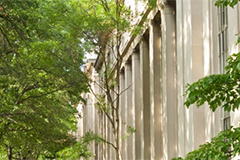 |
In the NewsNovember 17, 2017New initiative supported by $3.7 million in grantsResource DevelopmentMIT News OfficeThe MIT Security Studies Program launched today a collaborative program with the Harvard Belfer Center to mentor the next generation of foreign policy scholars with support from the Charles Koch Foundation. |
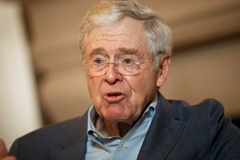 |
In the NewsNovember 11, 2017Libertarian billionaire Charles Koch is making a big bet on foreign policyGreg JaffeWashington PostStephen Walt, a professor at Harvard’s Kennedy School of Government, and Barry Posen, the director of MIT’s Security Studies program, will oversee the Koch-funded program at the two schools. |
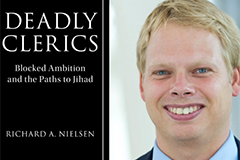 |
In the NewsNovember 9, 2017Why some Muslim clerics become jihadistsPeter DizikesMIT News OfficeWhat turns people into radical jihadist clerics? A new book by MIT political scientist Richard Nielsen offers a new answer: thwarted career ambitions.
|
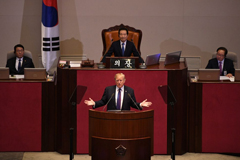 |
In the NewsNovember 8, 2017In speech to South Korean assembly, Trump tells the North 'Do not try us'Robin YoungHere & NowHere & Now's Robin Young discusses Trump's South Korea trip with Here & Now security analyst Jim Walsh (@DrJimWalshMIT). |
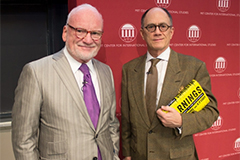 |
In the NewsNovember 3, 2017Why we should welcome warningsPeter DizikesMIT News OfficeRichard Clarke, the former chief counter-terrorism advisor on the National Security Council, expanded on ideas in his new book, “Warnings,” asserting that specialists…can “see the thing buried in the data that other people don’t see.” |
 |
In the NewsNovember 3, 2017For families of Japanese abducted by North Korea, Trump visit brings spotlightMotoko RichNew York TImes“The abductee issue pulls at the heartstrings of the general public in a way that no other issue can,” said Richard Samuels, a Japan specialist and the director of the MIT Center for International Studies. |
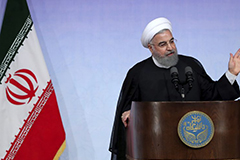 |
In the NewsOctober 13, 2017Trump will decertify the Iran nuclear deal. What does that mean?WBUR Here and NowJim Walsh, senior research associate at the MIT Security Studies Program, tells Here & Now's Robin Young that President Trump's move is largely symbolic. |
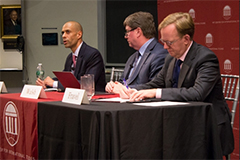 |
In the NewsOctober 5, 2017Nuclear and present dangerPeter DizikesMIT News“The bad news is that denuclearization is a fantasy,” said Vipin Narang, an associate professor of political science at MIT, who has written extensively about North Korea’s nuclear program. ... “The good news is, deterrence can work.” |
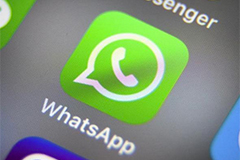 |
In the NewsOctober 2, 2017Mark Zuckerberg’s China dilemma: To kowtow or not?Audrey Jiajia LiThe Boston GlobeCan we really blame Zuckerberg for trying a bit too hard to prove that in facing the wealth of the world’s second largest economy, even a billionaire can be silenced? |
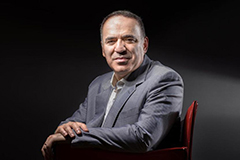 |
In the NewsSeptember 19, 2017Trump is a wake-up call for the free worldAudrey Jiajia LiBoston GlobeOn September 14, at the invitation of the Center for International Studies, Kasparov gave a talk on the “Trump-Putin Phenomenon” at a MIT Starr Forum and took questions from the Globe. |
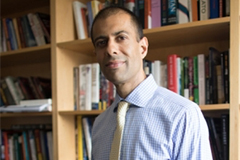 |
In the NewsSeptember 11, 2017Making sense of nuclear threats“Today it’s very clear North Korea has an asymmetric escalation strategy,” says Vipin Narang, a political scientist at MIT. “We’re in a very unstable phase right now.” |
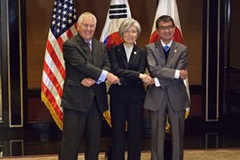 |
In the NewsAugust 29, 2017US leadership as a Pacific power: Trump and beyondMercy A. KuoThe DiplomatOver the past few years most countries in the region—including and especially US allies and partners—have become increasingly skeptical about the future of US leadership in the western Pacific... |


